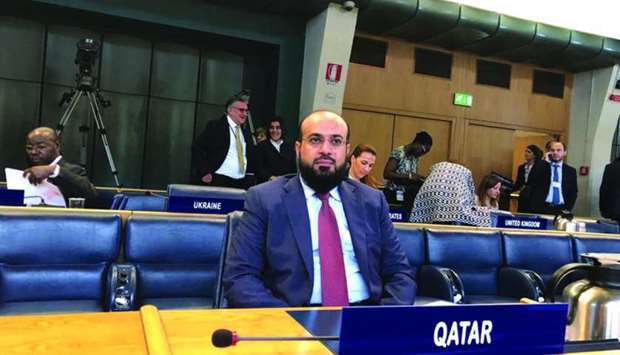Qatar, represented by the Ministry of Municipality and the Environment (MME), celebrated World Food Day on Tuesday.
On the occasion, the ministry held a number of events in co-operation with the relevant departments of the ministry and other authorities and local farms in the state. The ministry organised activities for students of different age groups with the aim of spreading awareness about the importance of the efforts to combat hunger.
On the occasion, HE the Minister of Municipality and Environment, Mohamed bin Abdullah al-Rumaihi said in his speech on Monday that Qatar's celebration of World Food Day is an affirmation of the necessity of providing food to every individual in line with the interest of the country’s leadership in developing resources and wealth especially in agriculture.
He said Qatar is working towards achieving self-sufficiency in many of these commodities and products, pointing out that the country has harnessed all its energies to work towards building food security.
In this context, the agricultural sector in Qatar, under the directives of His Highness the Amir Sheikh Tamim bin Hamad al-Thani, is of great importance as the sector is entrusted with achieving food security, and as one of the most important priorities of the State in the short, medium and long term.
This sector has made remarkable achievements on the path of sustainable development and self-sufficiency, especially after the allocation of QR70mn in annual support over the next five years to stimulate agricultural, livestock and fish production and marketing them in line with the agricultural strategy, which focuses on the expansion of agricultural products such as vegetables, dates, red meat, poultry, eggs, fish, milk and green fodder, taking into consideration the preservation of natural resources in the country and work to make good use of them.
Qatar attends FAO meeting in Rome
Qatar, represented by the Ministry of Municipality and Environment, participated in the celebration of the World Food Day held at the headquarters of the Food and Agriculture Organisation (FAO) of the United Nations in Rome on Tuesday.
Director of Research Department at the Ministry of Municipality and Environment Massoud Jarallah al-Marri, said during the ceremony that it focused on the importance of uniting efforts among governments, peoples and the private sector to achieve the goal of eliminating hunger by 2030, such as reducing post-harvest loss, correcting erroneous behaviours related to food habits that lead to waste of large quantities of food, and the importance of attention to the type of food so that it is healthy and does not lead to obesity, as well as consciousness that helps to produce large quantities of food with less consumption of water and energy, noting that the national strategy for food security which had been prepared by the commission, taking into account all of these challenges and provide solutions and initiatives to overcome them over the next five years.
World Food Day, which falls on October 16 each year, marks the anniversary of the founding of the United Nations' Food and Agriculture Organisation (FAO) in 1945. According to UN agencies, the number of hungry people in the world reached 821mn this year.
The agricultural strategy of Qatar focuses on increasing the production of agricultural items, such as vegetables, red meat, poultry, eggs and fish, taking into account the optimal utilisation of natural resources. Ambitious steps were taken by the Qatari agricultural sector to meet the requirements of the local market and raising the self-sufficiency in the plant, animal and fish sectors.
The most recent statistics show the significant development in agricultural production. The self-sufficiency in local vegetables was 24%, dates about 87%, and green fodder about 50%.
In 2018, the total area of protected greenhouses increased from 49 hectares in 2007 to 73 hectares in 2018. Thus, the quantities of vegetables produced increased from 4,814 tonnes last year to 6,500 tonnes this year. The area of unregulated greenhouses increased from 200 hectares in 2017 to 220 this year, leading to an increase in production from 17,000 to 20,000 tonnes, while the production of vegetables in open land increased from 33,000 tonnes in 2017 to 36,000 tonnes in 2018.
According to the latest statistics, this year's dairy products reached more than 500 tonnes per day, covering 83% of domestic consumption, compared to 154 tonnes a day in 2017, with a self-sufficiency rate of 24%.
For fresh poultry, production before the blockade reached 30 tonnes per day with a self-sufficiency of 50%, while currently it has reached more than 59 tonnes, covering 98% of the domestic consumption. For fish production, the current self-sufficiency rate is 80%, and is expected to reach 90% within two years, with plans to increase production as well as aquaculture projects, including floating cages projects.
Assistant Undersecretary for Agriculture and Fisheries Affairs at the Ministry of Municipalities and Environment, Sheikh Dr Faleh bin Nasser al-Thani, told QNA that there are ambitious plans to increase production in these agricultural sectors and food commodities, thus increasing self-sufficiency within the strategy of the agricultural sector in the Ministry.
The Ministry is also keen to establish and organise local agricultural events and participate in regional and international ones, including Qatar International Agricultural Exhibition, the sixth edition of which was held last March.



